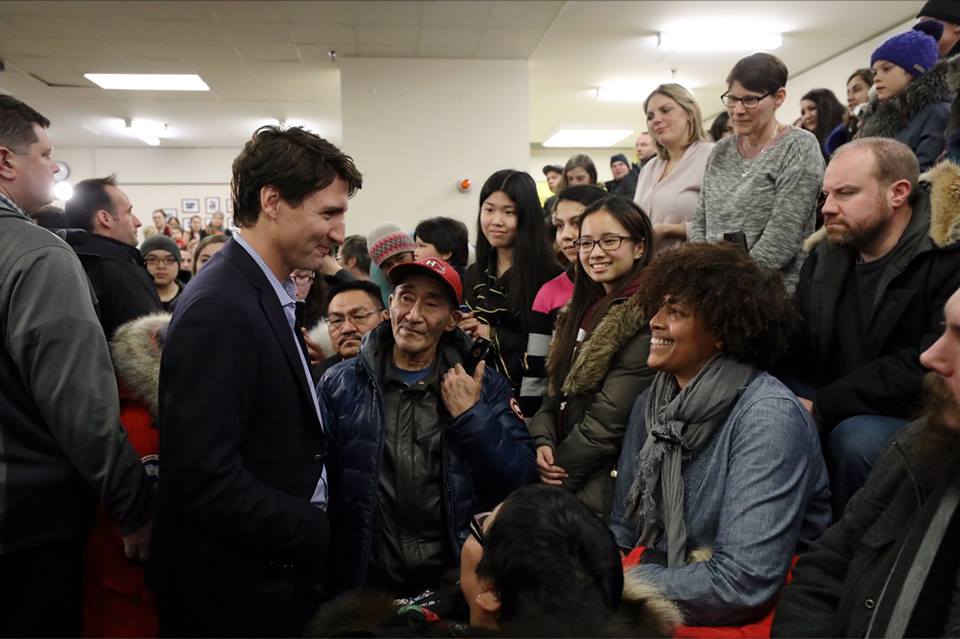Canada News
Northerners press Trudeau on electoral reform; PM admits ‘I turned my back’

Trudeau, travelling through the Arctic on a so-called “listening tour” of town hall meetings and photo-ops, has been confronted repeatedly by people who want to discuss why he’s no longer committed to electoral reform. (Photo: Justin Trudeau/Facebook)
YELLOWKNIFE—Now is no time to be provoking political instability in Canada, Prime Minister Justin Trudeau said Friday as he justified turning his back — his words — on his unequivocal promise to change the way Canadians elect their federal government.
Trudeau, travelling through the Arctic on a so-called “listening tour” of town hall meetings and photo-ops, has been confronted repeatedly by people who want to discuss why he’s no longer committed to electoral reform.
“It is because I felt it was not in the best interests of our country and of our future that I turned my back on that promise,” Trudeau said Friday when asked by a member of the audience about why he abandoned the plan.
“I know people will be disappointed, yep,” he continued as a smattering of boos rose up from the crowd.
“But this was my choice to make, and I chose to make it with full consequence of the cost that is possibly going to come (from) it, but I will not compromise on what is in the best interests of Canada. That’s what Canadians elected me for.”
In Iqaluit on Thursday, he evoked the controversy surrounding Conservative leadership hopeful Kellie Leitch and her stated plan to screen recent immigrants for so-called “anti-Canadian values” as one possible danger.
The following day in Yellowknife, Trudeau didn’t mention Leitch by name, but he did double down on the notion that an electoral system like proportional representation would give too much parliamentary power to fringe elements.
“If we were to make a change or risk a change that would augment individual voices, that would augment extremist voices and activist voices … I think we’d be entering an era of instability and uncertainty,” Trudeau said.
“We’d be putting at risk the very thing that makes us luckier than anyone else on the planet: the fact that we look at our differences as something to draw on and discover and build on, as opposed to emphasize and highlight.”
He went on: in a nutshell, while he has a responsibility to keep his promises, he has a greater responsibility to keep the country together.
“As strongly and as passionately as I believed we could move forward on improving our electoral system … I recognize a higher responsibility even than that, and that is the responsibility every Canadian prime minister has to keep this country together and united.”
As opposed to first-past-the-post, an electoral system in which the first party to win a majority of the seats gets to form a government, proportional representation is designed to more accurately reflect the results of the popular vote.
Eli Purchase, a candidate for the Green party in 2011 and the one who asked Trudeau about electoral reform on Friday, said he disagrees with Trudeau’s assessment.
“Proportional representation works,” Purchase said. “We know it works, based on other proportional representation governments around the world, and anything against it is just a deflection.”
A ranked ballot would be far better than the current first-past-the-post system, Purchase added.
Trudeau promised—during the 2015 election campaign, in the Liberal government’s first throne speech and several times since—that he would change the way Canadians cast ballots in federal elections in time for 2019.
His newly appointed minister of democratic institutions, Karina Gould, was dispatched to abandon the promise formally last week.
Trudeau dropped Leitch’s name in Iqaluit when confronted by a woman who wanted to know why he did not believe a system of proportional representation should replace the existing first-past-the-post voting system.
“Do you think that Kellie Leitch should have her own party?” Trudeau was heard to say.
“Because if you have a party that represents the fringe voices … or the periphery of our perspectives and they hold 10, 15, 20 seats in the House, they end up holding the balance of power.”
Trudeau was also heard to say that the federal New Democrats had been unwilling to budge on the idea of proportional representation. During question period Friday, New Democrat MP Murray Rankin accused him of “spreading alternative facts.”
“Do the Liberals not understand that blaming everyone else for their broken promises is exactly what breeds cynicism in politics?” Rankin said.
During the Yellowknife town hall, Trudeau said that holding a national referendum would foment discord and disunity at a time when the forces of nationalism and populism are whipsawing governments and countries across the globe.
A referendum would spark “division” and “a campaign that’s going to get a lot of heated rhetoric at a time where we’re looking for stability in the face of a very unpredictable and unstable political context around the world,” Trudeau said.
“I don’t think a referendum is the way to go.”





















